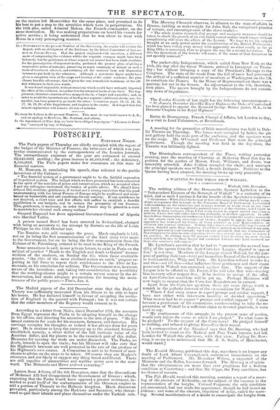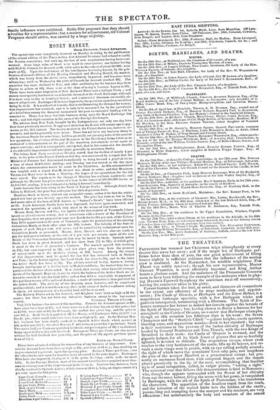A WARNING TO THE WHIGS FROM WALSALL.
Walsall, 301h December.
The retiring address of the Honourable Spencer Lyttelton to the " Independent Electors of the Borough of Walsall" is a curiosity of its kind, and as such I enclose it for the benefit of the Spectator's readers- .- Gentlemen—When I hat the honour of first addressing you, offering myself a can- didate to represent this borough in the Commons House of Parliament. I calculated with confidence on the UNDIVIDED AND ZEALOUS SUPPORT OF EVERY CLASS OF THE LIBI■ RAI, PARTY. I have now completed a persoual canvas of the electors ; and I regret to say, that in many instances where 1 had every reason to expect PROMPT AND coastal. answers., I have met with either lukewarm neutrality, or decided rqmosition. In addi- tion to these discouraging circumstances, I have had to encounter the AVOWED rummers' OF THE AGENTS FROM THE ANTI-CORN-LAW LEAGUE, deputed to oppose me; MIDI whose opposition has destroyed my chance of being returiled as Your Representative. BY DIVIDING THE LIRERAL INTEREST. Nothing but a firm conviction of the hopelessness of success, founded upon these obstacles, would have induced me to relinquish my pros- pects of reprmenting your borough; but turn now persuaded, that any continuance of this struggle in the present state of parties. werrno UNIX INJURE THE CAUSE TO WHICH I PLEDGED. In retiring from the present contest. I beg to return my most sincere and heartfelt thanks to those honest and cuusistent Liberals who have rendered me their able assistance and support."
Mr. Lyttelton's assertion that he had to "encounter the avowed hos- tility of the agents from the Anti-Corn-law League, deputed to oppose him," is not true. Members of the League visited Walsall, for the pur- pose of putting their test—total and immediate Repeal of the Corn-laws- to both candidates, Whig and Tory. Mr. Lyttelton refused to take it ; and then—not till then—what influence those gentlemen and their cause possessed in Walsall was exercised against him. The support of the League is to be offered to Mr. Foster, if he will take that test—leaving him in every other respect free. If he decline to accept of the offer, an Anti-Corn-law candidate will be pia up. Perhaps Ministers will now begin to suspect that the Corn 'law Repeaters are in earnest.
Apart from the Corn-law question, there are some things worth a remark in the pathetic farewell of the ex-candidate for Walsall.
" Where I had every reason to expect prompt and cordial support, I have met either with lukewarm hostility or decided opposition." What reason had he to expect" prompt and cordial support"? Unless because a gentleman of his connexions condescending to take the re- presention of Walsall be a sufficient claim to devoted gratitude, it were hard to say.
" My continuance of this struggle, in the present state of parties, would only injure the cause to which I am pledged." To what cause is he pledged? To the support of the Corn-laws? He pledged himself to nothing, and refused to pledge himself to their repeal.
A correspondent of the Standard says that Dr. Bowring, who had been invited to stand on the Radical and Free Trade interest, had left London for Walsall this afternoon, with that view. Failing Dr. Bow- ring, it seems to be understood that Mr. J. B. Smith, of Manchester, would stand.]
The Kentish Mercury, published this day, says there is no longer any doubt of Lord Albert Conyngham's retirement immediately on the meeting of Parliament. Mr. Henniker Wilson, a supporter of the Ministers and the Ballot, has come forward. The .3fercury is of opinio that the circumstances are more than ever propitious for a Reform candidate at Canterbury ; and that Mr. Gipps, the Tory candidate, has no chance of success.
The Fife Herald, received this morning, contains a report of a meet- ing of the electors of Kirkcaldy, on the subject of' the vacancy in the representation of the burghs. Colonel Ferguson, the only candidate yet announced, had not ma,de his appearance, though he had issued an address ; and some of the electors, impatient of delay, called the meet- ing. Several manifestations of a desire to emancipate the burghs from
family influence were exhibited. Bailie Hitt proposed that they should sivertise for a representative ; but a motion for adjournment, till Colonel Ferguson should arrive, was carried by a large majority.































































 Previous page
Previous page